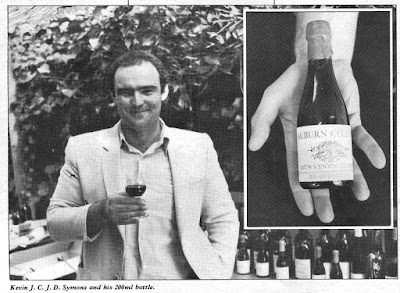Post-modern posters posting post-truth posts? Shelvish chaos sure infests liquor lists and walls
by PHILIP WHITE
Lucky to have perched more
than most at the bar at the bustling Salopian Inn, I have made a bit of a study
of gin chaos. They stock well over 100 gins there, many of them the work of the
new wave of hipster or craft distillers.
Of course the intention is
not to encourage customers to drink them all. Not at once, anyway. One can be
goaded through a tasting of selected types. One even has a choice of craft
tonics. But however I look at it, that wall of gin seems chaotic, even
threatening. Sinister. A lot of people have a lot to learn about making good
gin. Vodka with herbs. Botanicals. Or essences.
Add to this spiritous
realm the entire walls of deconstructionist post-truth wines that are blooming
malignantly in many cellars, bars and diners, often masquerading as natural,
and we begin to see what I was taught to recognise as a mess.
Many wine lists and liquor shelves become as cluttered as old notice boards ... the additions develop their own layers of relativity, reflecting generations of indecision rather than skill ... note the George Grainger Aldridge portraits of the staff here in my beloved Exeter, whose crisp chalkboard wine list is the tidy opposite of these priceless layers of pin-ups
Usually of the belief that
most people are too stupid to actually conspire, I nevertheless think it's no
accident that the destructive reactionary orange flash of Trump coincided with
the advent of orange wine.
"Things fall apart;
the center cannot hold ... "
Not to mention the new
army of beer-makers. Or producers of beer made largely by other people
somewhere else in bigger factories that the nuts-and-berries-pretender-vendor
would prefer you to overlook.
Beers awkwardly flavoured with chocolate, coffee, honey or
ginger seem quite faddy this week.
To deal with this
fractured market, another army of instant critics foments away on the blogs and
gossponds of the cobweb, trumpeting forth, seasoned scholars of the sauce;
gooing lugubrious praise on products that didn't exist the day before. Instant
provenance.
Just whip it in.
I'm guilty, your honour.
Regular readers may recall
me suggesting that such chaos was utterly predictable. Once nearly all the beer
in Australia began to smell like Carlton United hop essence one could see the
unrest fomenting as boutique brewers first tentatively appeared in pubs like
Coopers Alehouse, the Lord Nelson, the Port Dock and Matilda Bay in the later
'eighties into the 'nineties.
Liquoristically, beatniks
became hippies became yippies became the weather underground. I've yet to see serious Panther activity, which will probably come. That'll be better.
But like the tides, those reactionaries disguised as revolutionaries came and went in
their various guises. Now they're tsunamied right up. Fractal chaos!
Sometimes I prefer to gaze upon a simpler, more classically-stacked shelf
Same in the wine world.
Submerging the country in very ordinary Chardonnay or lumberjacked gloopy
Shiraz for twenty years didn't help much with variety and texture in the
marketplace: somebody with a beard was certain to make a break back toward the
days when viands actually varied.
One of the first such
knights to get errant and loose in the plonk cosmos was one Kevin John Casmir
Jacob Donovan Symons, who bought the Auburn Temperance Hall from Rick Robertson
in 1982 and filled it with barrels of fortified, largely of a sort of portish
variety.
Having previously worked
at Golden North Honey Icecream , Symons recommended his customers wander across
the road to the Golden North deli so they could blend his marsala with the cool
honeyed ice.
This early example of what
has become known as 'pairing' opened a window of what the vigneron saw to be
opportunity: he began blending flavour essences and whatnot with this fortified
grape juice, to be sold in handbag-sized (200mL.) bottles. His chocolate port
and blackberry nip were novel enough as far as quirky tinctures went; I drew
the line when he claimed to have perfected the steak-and-kidney pie port with
some strange essence he'd procured, perhaps from Royce Wells.
I remember making bad
tomato sauce jokes. Rosella feathers in the barrels. Unfair to the adventurous Kevin, who was at least having a go.
Thirty-five years later I
notice Black Stump Wines setting up over the ridge from Auburn in the Riverton
Railway Station, proudly offering a range of flavoured fortified Rieslings in 375mL. bottles: Riesling Forte Lime
Fresco, Lemon Fresco, and Mandarinho, which makes a bit more sense than torturing
port 'til its tastes like steak-and-kidney.
Sweet Riesling juice has
been fortified to 16.5% alcohol with brandy spirit, flavoured with Riverland
citrus and aged for a year on oak before bottling. They're pretty good with ice
and soda.
The old pint of hock, lime
and lemonade comes to mind.
At least, given their
fortified nature, such products offer some reliability and consistency. What
deters this critic from recommending many of the craftier spirits, beers and
wines is their variability: like bladder packs, artisan batches can change so
much there's no guarantee that my reader will get to taste the same product I
recommended, if indeed I did.
As for natural wines, the
orange people and these neo-Mennonites? I can't for the life of me understand
why anybody would make, sell or buy wine with the shelf life of unpasteurised
milk.
I mean, like, you wouldn't drink it, would you?
Reminds me of the old Paul Keating joke. How do you make yoghurt? Put a glass of milk on the mantlepiece and get Paul to stare at it for two minutes.
Anyway, talking stability, I reckon I've got
that gin wall licked. If I want a genteel, fragrant delight I'll take a shot of
The Botanist, that brilliant stuff developed by master malt whisky maker Jim
McEwin at Bruichladdich on Islay. Last thing he did before he retired was make a spirit flavoured with local botanicals, just as the ancient whisky-makers produced before they discovered cheap sherry barrels and the flavours changed.
I prefer it neat, with one small ice block.
Bruichladdich on Loch Indaal on the Rhinns of Islay photo supplied
Well, neat within reason.
I dribbled like a goon as I slurped through a bowl of Goolwa Beach pippies with
my Botanist at the weekend. Something very Islay about that: the seashore
cockles with their mild herby broth seem to meld spiritually with the long list
of foraged botanicals that Jim and his crew collect in the nooks and crannies
of that windswept isle between Scotland and Eire.
Just don't ever use that
'pairing' word within my earshot: I can't hear it without thinking of toenail
clippings.
Which pushes me into the
realms of desiring a gin more brusque and brutal to finish the job: something
more forceful with some martial rigour to tidy this mess right up: Plymouth Navy Strength will do the
trick, thankyou. Neat, with one big ice block and a crisp Navy salute.
Bacchus only knows how a US Army gin would compare to the British Navy model ... at the risk of pushing the martial rigour too far, spare a thought for poor Thomas Thetcher





















No comments:
Post a Comment